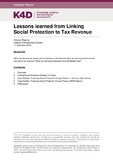Lessons learned from Linking Social Protection to Tax Revenue
Abstract
Social protection and taxation have emerged as two of the key policy instruments available to governments in the pursuit of the Financing for Development (FFD) goals and Sustainable Development Goals (SDGs). There is a growing recognition among policy makers in the international development context of the powerful role fiscal policy plays in shaping development outcomes. This represents an important opportunity for the closer consideration of the ways in which taxation and social protection operate jointly in practice (Bastagli, 2015a). Developing countries often struggle to generate government revenues for social protection through taxation and social security contributions. Tax authorities tend to be weak and taxation lack transparency, while a relatively large share of the population is employed in the informal sector, making it difficult and costly to collect social security contribution or tax employees. This limits the means to redistribute income and to develop adequate social protection systems to reduce poverty and inequality (ILO, 2016). The removal of ineffective tax subsidy policies (e.g. Jordan, Egypt, Morocco, Oman, etc.) and taxes on financial transactions (e.g. Brazil) may provide the necessary funds to launch/expand social protection programmes. Further, taxes on natural resources in resource-rich countries can support social spending and generate overall economic growth. The evidence from countries like Bolivia, Brazil, and Zambia (i.e. case studies noted in Section 3) shows the positive socio-economic effects that natural resource extraction can have. This rapid literature review looks at reports issued by different development agencies; international financial institutions; government bureaus and some academic publications – regarding different social protection/social security programmes and how different tax policies and tax reforms have been used in their financing.
Citation
Megersa, K. (2019). Lessons Learned from Linking Social Protection to Tax Revenue. K4D Helpdesk Report 717. Brighton, UK: Institute of Development Studies.Is part of series
K4D Helpdesk Report;717Rights holder
© DFID - Crown copyright 2019Collections
- K4D [937]

